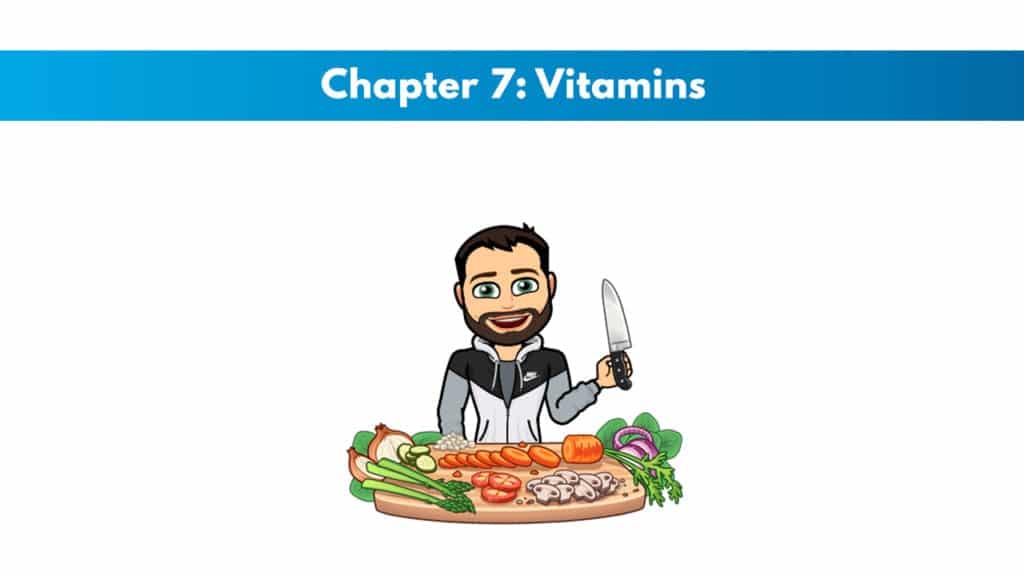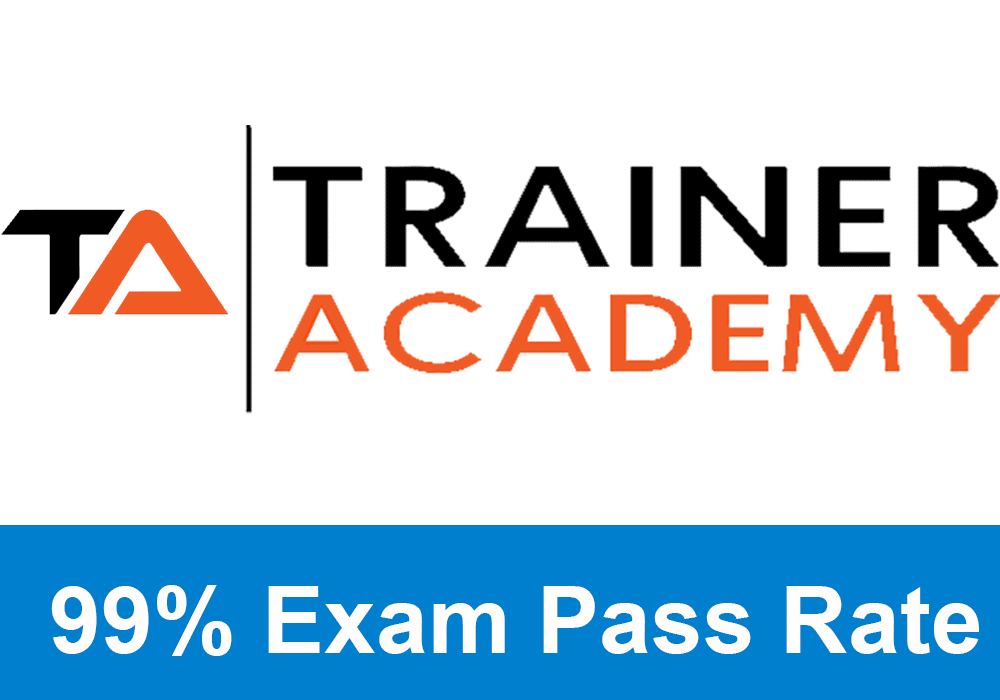
If you have not yet signed up for the ISSA Nutritionist certification, you can get it here for free as part of a special bundle.
Get your copy of the ISSA Nutritionist exam cheat sheet. It helps immensely for studying for the exam.
My PTP students report cutting their ISSA Nutritionist study time and effort in half with Trainer Academy.
Benefit from the Exam Pass Guarantee and Retake Fee Guarantee. Plus, take advantage of my current discount code PTPJULY for 50% off the MVP Program (Ends July 15th, 2025).
Try it out for free here to see if it’s right for you, or read my detailed review for further insights.
Chapter Goals:
- Be able to discuss the fat-soluble and the water-soluble vitamins.
- Know the main roles of each vitamin.
- Be able to discuss the benefits of vitamins for health and optimal physiological performance.
- List the important food sources for the vitamins.
Introduction
Vitamins are micronutrients required in the diet for maintaining good health, functioning normal metabolism, growth of bone and tissue, recovery, healing, immunity, performance athletically, and much more than those.
We find vitamins in fruits, vegetables, grains, milk, and dairy. Vitamins are organic, so they contain carbon atoms in their chemical structure.
Vitamin Classifications
These are organized and classified by how they will be absorbed and stored in the body.
The first vitamin ever discovered was vitamin A in 1911.
Fat-Soluble Vitamins
The fat-soluble vitamins are A, D, E, and K.
The fats are fat-soluble since they can only dissolve in fats and organic solvents.
These vitamins will be stored in large amounts in the body fat and liver.
Toxicity from these vitamins is rare but possible, and supplements make it easier to exceed safe intake.
Vitamin A (Retinol, Beta-Carotene)
The role of the body is in the eye health and vision, the immune system, reproduction, and the development of the fetus. Carotenoids belong to a class of molecules similar to vitamin A, giving pigments to their foods.
Vitamin A deficiency will cause dry skin, rashes, frequent infection, and night blindness or just impairments in vision generally.
Excess intake occurs acutely or chronically, and the symptoms include things like nausea and vomiting, yellow dry skin, loss of hair, pain in your bones, and swelling of the bones.
Good food sources include liver, fish, eggs, crab, halibut, and whole milk products.
When talking about athletes, the intake of vitamin A is very important for overall health and performance.
Vitamin D (Calciferol)
The roles of vitamin D are quite important. It is essential for growth and development. Some main specific functions are the absorption and metabolism of calcium and phosphorous for the ongoing support of the mineralization of bones and teeth.
Deficiency in vitamin D is shown through poor mineralization of bones and associated abnormalities.
Vitamin D can be quite toxic when receiving excess, especially in younger adults and children. The consequences are build-up in the soft tissues and irreversible kidney and cardiovascular system damage.
Dietary sources of vitamin D include fish liver oil, buttercream, halibut, and many types of seafood.
Vitamin E
Exclusive PTP CPT Offers |
||
|---|---|---|
Most Popular Cert | Best Online NCCA Cert | Best Study Materials |
Gold Standard Cert | A Good Option | Best CPT for you?  |
The major function of vitamin E is as an antioxidant that prevents free radical reactions and protects the fatty acids within the cell membranes.
Vitamin E deficiency has been observed in other animals but not so much in humans. But it is known that babies will have lower concentrations of the vitamin in their cells.
Toxic intake occurs around 1,000 mcg or more of vitamin E. it can lead to anticoagulant problems and delays in blood clots.
Food sources high in vitamin E include things like vegetable oils, soybeans, corn, peanuts, and safflower.
Vitamin K
This is used as a coenzyme for the promotion of prothrombin and procoagulants. Essentially the roles will involve coagulation and blood clotting.
Deficiency in vitamin K is very rare in healthy people, but if green veggies are restricted, it is possible.
No real problems have been found with this vitamin’s excessive long or short term intake.
The main sources of vitamin K are green leafy vegetables.
Water-Soluble Vitamins
The water-soluble vitamins include vitamin C and the whole family of B vitamins.
They will not be stored in the body in any significant amounts as they only dissolve in water and are sent out with our urine.
Vitamin C (Ascorbic Acid)
Vitamin C serves many roles as both a cofactor and an enzyme. It has a role in the forming and maintaining of collagen, which is, of course, a major connective tissue.
Vitamin C has various roles:
- Promotion of healthy capillaries, gums, and teeth.
- Aiding in the absorption of iron and its transport and storage.
- Prevention of the oxidation of folacin.
- Helping to heal the wounds in the body.
- It may have some significant impact on resistance to infection.
- Aiding in the metabolism of tyrosine and phenylalanine.
- It works to boost the immune system.
- Protection from damage from free radicals.
Vitamin C deficiency can lead to diseases like scurvy, with weak connective tissues.
More than 2 grams of vitamin C per day has been seen to lead to some serious side effects like headache, increased urination, diarrhea, and nausea.
Some food sources include fruits and vegetables.
It may be quite beneficial for athletes to increase their vitamin C intake.
Vitamin B1 (Thiamin)
Thiamin is converted to coenzymes and this works to help break down carbohydrates and branched-chain amino acids.
Deficiencies in this vitamin have some serious effects on our carb metabolism, showing signs of fatigue, a loss of appetite, depression, poor coordination, and diseases like beriberi.
Excess intake is cleared by the kidneys and has rarely ever been reported in healthy adults.
It may be possible to increase athletic performance for endurance athletes by increasing the intake of thiamin 5 days before a competition.
Vitamin B2 (Riboflavin)
This coenzyme is involved in energy production and cellular respiration.
Deficiency symptoms include inflammation of the lips, cracked and dryer skin, reduced growth rate, loss of hair, and things like cataracts.
There is no unsafe amount of riboflavin that exists so far.
Exclusive PTP CPT Offers |
||
|---|---|---|
Most Popular Cert | Best Online NCCA Cert | Best Study Materials |
Gold Standard Cert | A Good Option | Best CPT for you?  |
This vitamin comes from brewer’s yeast, meats, poultry, fish, and similar products.
Vitamin B3 (Niacin)
This is functionally active in the body, and there are two important coenzymes it takes the form of. They will both be present in all cells and function in vital metabolic processes.
Deficiency in this vitamin can cause symptoms like depression, confusion, headaches, elevated body fat levels, fatigue, and pellagra.
Intakes over 50 mg have been seen to cause serious effects on the skin.
This vitamin’s sources include liver, brewer’s yeast, leaner meats, whole grains, nuts, legumes, and potatoes.
Excess intake of this vitamin may cause negative effects on the athlete’s performance and should be avoided in general.
Vitamin B6 (Pyridoxine)
This plays a role in metabolizing the amino acids, glycogen, and sphingoid bases.
Deficiency in this vitamin will cause symptoms like depression, skin problems, poor healing from wounds, anemia, fatigue, and convulsive seizures.
Toxicity occurs around 1,000 mg per day and causes some serious problems.
Even 100 – 300 mg can be toxic and cause problems for people.
Food sources for this vitamin include things like chicken, kidney, liver, eggs, rice, soybeans, bananas, and walnuts.
Endurance athletes should avoid higher doses of this vitamin as it is seen to impair performance in general.
Vitamin B9 (Folate)
This vitamin is involved in amino acid metabolism and the synthesis of nucleic acids. It is needed as a cofactor for the formation of our DNA and RNA, for the synthesis of proteins, and for the division of cells.
Deficiency can cause symptoms like anemia, birth defects, soreness of the tongue, problems with digestion and growth fatigue, and megaloblastic anemia.
Toxic levels are considered to be above 1,000 mcg daily and may cause damage to kidneys and stimulate seizures in epileptic people.
Food sources include most animal meats, asparagus, whole wheat, dark leafy veggies, and yeast.
Endurance athletes may greatly benefit from folate and its role in producing red blood cells and repair of tissues.
Vitamin B12 (Cobalamin)
This is absolutely essential for energy in the body.
This deficiency is not common in the diet unless someone has a poor absorption of the vitamin. These deficiencies may cause anemia, fatigue, irritability, loss of appetite, constipation, and tongue soreness.
No adverse effects have been found with the vitamin.
Dietary sources include many types of meat, and it is important to know that vegans may need to consider supplementing this vital vitamin.
Vitamin B7 (Biotin)
This coenzyme is used in carboxylation reactions and has a role in the metabolism of energy, formation of urea, synthesis of protein, and metabolizing the amino acids, glucose, and fatty acids.
Deficiency can result from low levels in the diet but also the excessive consumption of egg whites.
Some common toxicity signs could be skin rashes, but no designated unsafe level exists.
Food sources include liver, egg yolk, soy flour, nuts, and legumes.
The role in cellular energy production could interest athletes and supplementation.
Vitamin B5 (Pantothenic Acid)
This plays many vital roles in metabolism, mainly as a component of Acetyl CoA.
Deficiencies will cause weakness, irritability, burning feet, vomiting, and insomnia.
Toxic levels are considered when the intake is over 10 – 20 grams daily.
Food sources include potatoes, eggs, pork, beef, fish, milk, whole wheat, and vegetables.
This may benefit athletes to focus on and supplement, more so for endurance athletes.
Vitamin-Like Compounds
These are classified as neither fat nor water-soluble vitamins, and they are still quite important, mainly as parts of cellular metabolism and other bodily processes.
Choline
This vitamin is involved in the metabolism of fatty acids, the liver’s function, and the cell membranes’ structural integrity.
Deficiencies have not really been observed, but they could interfere with the liver.
Intake exceeding 2 grams daily will likely cause toxicity and bad side effects.
Dietary sources include things like egg yolk, soybeans, most fatty foods, and wheat germ.
There have been some reports of advantages delaying muscle soreness and fatigue when athletes supplement this vitamin.
Vitamin B8 (Inositol)
This is a lipotropic agent like the last vitamin, and it works to fill its roles in fatty acid metabolism, carb metabolism, and mobilization of intracellular calcium.
Deficiency has been shown to cause a fat buildup in the liver and may affect the nervous system functioning.
Toxic levels are shown at around 12 grams or more per day.
Food sources include things like heart, organ meats, whole grains, fruit, milk, seeds, and vegetables.
FAQ’s about vitamins
What are the 13 types of vitamins?
The 13 types of vitamins are vitamin A, vitamin C, vitamin D, vitamin E, vitamin K, and the eight B vitamins: thiamine (B1), riboflavin (B2), niacin (B3), pantothenic acid (B5), pyridoxine (B6), biotin (B7), folate (B9), and cobalamin (B12).
What are the five most important vitamins?
The five most important vitamins for overall health are vitamin C, D, B12, A, and E, crucial for immune function, bone health, nerve function, vision, and skin health, respectively.
How can vitamin deficiencies affect overall health?
Vitamin deficiencies can have significant impacts on overall health, leading to a range of symptoms and health problems. For example, vitamin D deficiency can weaken bones and increase the risk of fractures, while vitamin C deficiency can lead to weakened immunity and scurvy.
How can a balanced diet ensure adequate vitamin intake?
A balanced diet consisting of a variety of fruits, vegetables, whole grains, lean proteins, and healthy fats can ensure adequate vitamin intake. By including a diverse range of nutrient-rich foods in your diet, you can obtain essential vitamins naturally, reducing the need for supplements and minimizing the risk of deficiencies.

 Have a question?
Have a question? 



Tyler Read
PTPioneer Editorial Integrity
All content published on PTPioneer is checked and reviewed extensively by our staff of experienced personal trainers, nutrition coaches, and other Fitness Experts. This is to make sure that the content you are reading is fact-checked for accuracy, contains up-to-date information, and is relevant. We only add trustworthy citations that you can find at the bottom of each article. You can read more about our editorial integrity here.